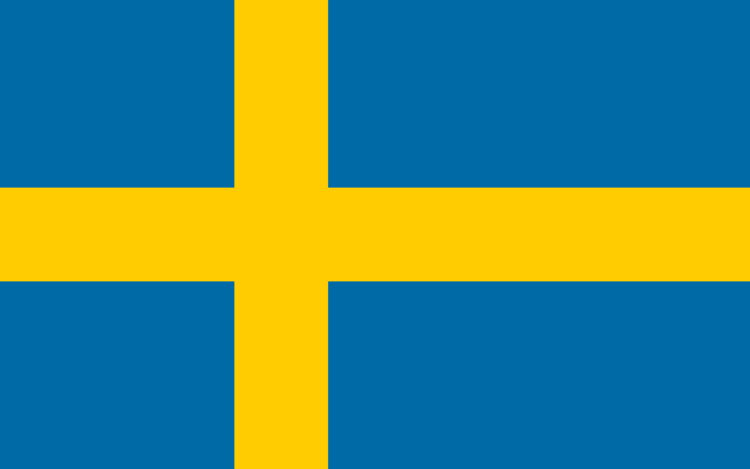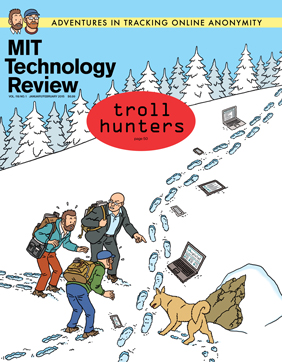


By Steve Sailer
12/20/2014
The MIT Technology Review runs a long story about the Swedish heroes waging war against outmoded concepts such as privacy and freedom of speech.
It reads like one of those prolefeed stories that the Ministry of Truth generates in 1984 in which the moral polarities are reversed 180 degrees, but who notices little details like that anymore?
The Troll Hunters
A group of journalists and researchers wade into ugly corners of the Internet to expose racists, creeps, and hypocrites. Have they gone too far?
By Adrian Chen on December 18, 2014
We’ve come up with the menacing term “troll” for someone who spreads hate and does other horrible things anonymously on the Internet. Internet trolls are unsettling not just because of the things they say but for the mystery they represent: what kind of person could be so vile? One afternoon this fall, the Swedish journalist Robert Aschberg sat on a patio outside a drab apartment building in a suburb of Stockholm, face to face with an Internet troll, trying to answer this question. The troll turned out to be a quiet, skinny man in his 30s, wearing a hoodie and a dirty baseball cap — a sorry foil to Aschberg’s smart suit jacket, gleaming bald head, and TV-trained baritone. …
The goal of Troll Hunter is not to rid the Internet of every troll. “The agenda is to raise hell about all the hate on the Net,” he says. “To start a discussion.”
Back at the Troll Hunter office, a whiteboard organized Aschberg’s agenda. Dossiers on other trolls were tacked up in two rows: a pair of teens who anonymously slander their high school classmates on Instagram, a politician who runs a racist website, a male law student who stole the identity of a young woman to entice another man into an online relationship. In a sign of the issue’s resonance in Sweden, a pithy neologism has been coined to encompass all these forms of online nastiness: näthat (“Net hate”). Troll Hunter, which has become a minor hit for its brash tackling of näthat, is currently filming its second season.
From Wikipedia:
Robert Aschberg (born 19 March 1952 on Kungsholmen, Stockholm) is a Swedish journalist, media executive, and one of Sweden’s most popular TV personalities.[1] He works for the TV3. Robert is the grandson of Olof Aschberg, a Swedish-Jewish bank entrepreneur.
From Wikipedia:
Olof Aschberg (22 July 1877 — 21 April 1960) was a Swedish banker and businessman. Aschberg was a leftist sympathizer and helped finance the Bolsheviks in Russia. In gratitude, the Bolshevik government allowed Aschberg to do business with Soviet Union during the 1920s. Aschberg became head of Ruskombank, the first Soviet international bank.[1]
After 1917, the civilized world tried to choke off the Bolshevik regime with sanctions, but Olof Aschberg organized a way for Lenin to fence stolen gold, jewels, and other loot across the Baltic, which saved Communism (and made the Aschberg family a bundle). See historian Sean McMeekin’s History’s Greatest Heist: The Looting of Russia by the Bolsheviks for the full story.
Hate is having a sort of renaissance online, even in the countries thought to be beyond it.It is generally no longer acceptable in public life to hurl slurs at women or minorities, to rally around the idea that some humans are inherently worth less than others, or to terrorize vulnerable people. But old-school hate is having a sort of renaissance online, and in the countries thought to be furthest beyond it. The anonymity provided by the Internet fosters communities where people can feed on each other’s hate without consequence. They can easily form into mobs and terrify victims. Individual trolls can hide behind dozens of screen names to multiply their effect. And attempts to curb online hate must always contend with the long-standing ideals that imagine the Internet’s main purpose as offering unfettered space for free speech and marginalized ideas. The struggle against hate online is so urgent and difficult that the law professor Danielle Citron, in her new book Hate Crimes in Cyberspace, calls the Internet “the next battleground for civil rights.”
That Sweden has so much hate to combat is surprising. It’s developed a reputation not only as a bastion of liberalism and feminism but as a sort of digital utopia, where Nordic geeks while away long winter nights sharing movies and music over impossibly fast broadband connections. Sweden boasts a 95 percent Internet penetration rate, the fourth-highest in the world, according to the International Telecommunication Union. Its thriving tech industry has produced iconic brands like Spotify and Minecraft. A political movement born in Sweden, the Pirate Party, is based on the idea that the Internet is a force for peace and prosperity. But Sweden’s Internet also has a disturbing underbelly. It burst into view with the so-called “Instagram riot” of 2012, when hundreds of angry teenagers descended on a Gothenburg high school, calling for the head of a girl who spread sexual slander about fellow students on Instagram.
You know, that was actually a mob of Muslim students worked up into an Old Testament-style frenzy over imputations of sexual dishonor.
The more banal everyday harassment faced by women on the Internet was documented in a much-discussed 2013 TV special called Men Who Net Hate Women, a play on the Swedish title of the first book of Stieg Larsson’s blockbuster Millennium trilogy.
You know, Stieg Larrson’s blockbuster Girl with the Dragon Tattoo trilogy is actually lunatic hate porn that Sabrina Rubin Erdely couldn’t top.
… In addition to Aschberg, a group of volunteer researchers called Researchgruppen, or Research Group,has pioneered a form of activist journalism based on following the crumbs of data anonymous Internet trolls leave behind and unmasking them. In its largest troll hunt, Research Group scraped the comments section of the right-wing online publication Avpixlat and obtained a huge database of its comments and user information. Starting with this data, members meticulously identified many of Avpixlat’s most prolific commenters and then turned the names over to Expressen, one of Sweden’s two major tabloids. In December 2013, Expressen revealed in a series of front-page stories that dozens of prominent Swedes had posted racist, sexist, and otherwise hateful comments under pseudonyms on Avpixlat, including a number of politicians and officials from the ascendant far-right Sweden Democrats. It was one of the biggest scoops of the year. …Martin Fredriksson is a cofounder of Research Group and its de facto leader. He is a lanky 34-year-old with close-cropped hair and a quietly intense demeanor, though he is prone to outbursts on Twitter that hint at his past as a militant anti-racism activist. … The group currently has 10 members, all volunteers, including a psychology graduate student, a couple of journalism students, a grade school librarian, a writer for an online IT trade publication, and a porter in a hospital. The little organizing that occurs typically happens in Internet relay chat rooms and on a wiki. But analyzing the Avpixlat database, which contained three million comments and over 55,000 accounts, required a centralized, systematized process. An image on the main page of the intranet pokes fun at the immensity of the task. Two horses have their heads stuck in a haystack. “Find anything?” asks one. “Nope,” says the other. …
Since then, its members have investigated the men’s rights movement, Swedish police tactics, and various right-wing groups. Until the Avpixlat story they had mostly published their findings quietly on their website or partnered with small left-wing news organizations. “The official story is that we pick subjects about democracy and equality,” says Fredriksson. “But the real reason is that we just have special interests — we just try to focus on stuff that interests us as people.” …
Fredriksson is a member of a generation of Swedes known as “Generation 64,” who grew up tinkering with Commodore 64s in the 1980s and went on to revolutionize Sweden’s IT industry. His upbringing also coincided with the rise of a neo-Nazi movement in the 1990s, when he was a teenage punk rocker. He and his friends constantly clashed with a gang of skinheads in his small hometown in southern Sweden. “I was very interested in politics. I came to the conclusion that if I wanted to do politics I’d have to deal with the Nazi threat in some way,” he says. He joined the controversial leftist group Antifascistisk Aktion (AFA), which openly endorses the use of violence against neo-Nazis. In 2006 he was sentenced to community service for beating a man during a fight between a group of neo-Nazis and antiracists.
So, basically, the hero of the article is a violent criminal who has aged out of street fighting. But he’s a violent extremist leftist criminal, so he’s a good guy.
… The mass unmasking of Avpixlat commenters in 2013 was an accidental consequence of this curiosity. Avpixlat is an influential voice in Sweden’s growing right-wing populist movement, which is driven by a xenophobic panic that Muslim immigrants and Roma are destroying the country. The site fixates on spreading stories of rapes and murders committed by immigrants, which it contends are being covered up by the liberal establishment.
So the good guys are the ones trying to keep rapes covered up. The Left’s volunteer auxiliary thought police are targeting anyone trying to expose Sweden’s problem with Rape Culture.
Freud’s concept of “Projection” keeps looking better and better.